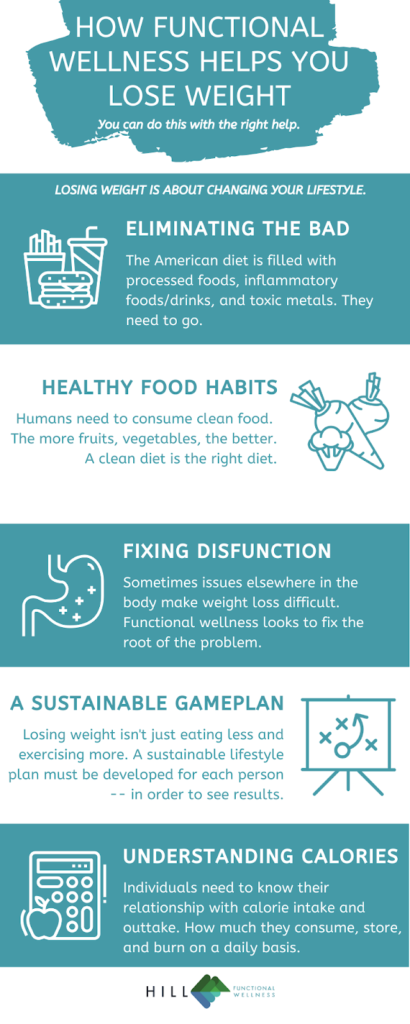Almost 40 percent of Americans are believed to be overweight. It is a problem that is gaining momentum, with an ever-growing percentage of children being included in this category as more time passes. Today, almost one in five children are classified as obese. There are a number of reasons for this concerning trend, but we’re going to place our focus today on how functional wellness can help change the trend.
Being overweight can lead to the development of other diseases like cancer, heart disease, diabetes, back pain, and even mental health issues like anxiety and depression. Maintaining a healthy weight has little to do with presenting a specific body image, and everything to do with preserving the healthy function of your body systems. Remember this: excess weight (body fat) is a symptom of underlying dysfunction, not necessarily the primary problem itself. So addressing those underlying driving forces should be the focus.
A major factor as to why America struggles with weight centers around the lifestyle factors that have become widely accepted. Sadly, there has never been an easier time in history to be overfed and undernourished. The food that is found on grocery store shelves and in fast-food restaurants is littered with processed chemicals that inflict more harm than good on the body. Filled with processed fats, high-fructose corn syrup, and artificial ingredients, these types of foods inflame the body and lead to more fat cells being developed. Couple this standard American diet with a growing arsenal of sedentary lifestyle factors, and it’s clear to see why weight gain and poor health outcomes have become so prevalent.

Weight Gain & Other Factors
Weight gain isn’t necessarily just a diet and exercise problem. Many individuals suffer from underlying issues that make weight loss nearly impossible. Common perception in the world of weight loss is to think about it through the lens of the simple caloric equation: calories in minus calories out equals weight gain/weight loss. As is usually the case, though, when you oversimplify a complicated concept, you can miss the mark when taking action. Therefore, our job here at Hill Functional Wellness is to look beneath the surface and understand your individual health status as a whole person, not just the calories you consume and burn.
One common example of a more intricate weight loss balance has to do with a concept called lipophilicity. Individuals that are exposed and consume high levels of heavy metals like aluminum are likely to put on weight because the body will store these toxic byproducts in fat tissue. When the body deposits these heavy metal compounds into fat cells, it makes it harder to shed this fat for fear that the noxious metals are released back into the bloodstream. Therefore, by making changes to regularly consumed foods or an individual’s environment, the heavy metal levels can decrease and weight loss becomes more tenable.
Other possible issues that may cause weight gain include:
- Chronic inflammation
- Low thyroid function
- Poor blood sugar control
- Problems with digestion
- Food allergies or food sensitivities
- Slow metabolism due to poor energy production in cells
- Hormone imbalance
- Lack of physical activity
- Stress
- Overactive adrenal glands
Final Thoughts on Functional Wellness & Weight Loss
Our philosophy here is simple: we teach how to exercise, how to eat, and how to live a clean life. The misconception with losing weight is that an individual just needs to eat healthier and exercise more — that’s incorrect. Diets don’t work. Lifestyle changes do.
It seems daunting at first, but an adjustment to lifestyle choices and habits is the only way to see long-term weight loss success. But it is unrealistic to ask someone to flip the switch on old ways of life — it’s just not sustainable for many people. That’s why we work closely with you to understand your lifestyle and environment as an individual in order to create a sustainable plan that incrementally improves your lifestyle habits. We focus on finding a treatment plan that other offices have overlooked — a plan that is based on your needs and where you are in life.
Losing weight requires a multifaceted approach, yes. But a useful starting point can be learning about your relationship with calories — how much enters your body and how much is burned on a daily basis. From there blood testing is needed to clearly see what your body is telling us and can help point to other internal deficiencies that are preventing weight loss.
Next, we are going to want to cut out processed foods, inflammatory foods, and environmental toxins. Then we can focus on consuming whole, real foods that support gut health. Paired with proper water intake and regimented exercise — functional wellness will have you on your way to not only improving your weight but also your life.


